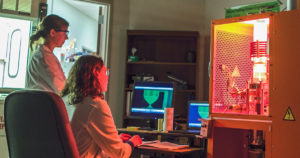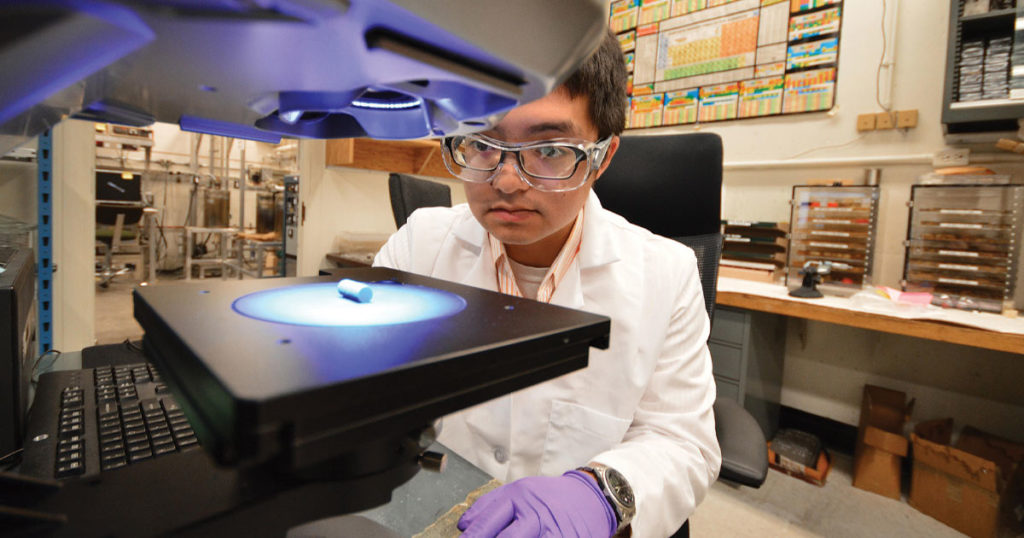If you’re curious about the impact of MSE, simply take a look around you. As the name implies, it’s the study of materials: how they perform, how they are made, and how their properties can be used in everything from nuclear reactors to computers, from medical implants to aircraft.
In fact, MSE is the only engineering discipline that intersects with all other disciplines of engineering. Our primary focus is on the three main categories of metals, ceramics, and polymers, but we also study composites, nanomaterials, and biomaterials.
By joining the Tickle College of Engineering at the University of Tennessee, Knoxville, as an MSE major, you won’t just be shaping the rest of the college’s work, but the very world around you.
A World-Renowned Faculty
Our faculty is fueled by global thought leaders that includes UT-ORNL Governor’s Chairs, distinguished professors, research center directors, and named professors, making it one of the most prestigious in the Southeast.
—Brandon Davis, Class of 2018

Why Materials Science & Engineering
—Alyssa Lindsey, Class of 2019
Small Class Sizes
We have a student-to-faculty ratio of 6:1, which means our faculty are closely connected to our students, and you’ll quickly get to know your peers.
Scholarships
In addition to UT’s scholarships, many MSE students also receive departmental funds between $800 and $2,600 per year. Learn more about these scholarships.
Interactive Classes
We emphasize hands-on lab work to complement classroom learning. You’ll receive training and conduct projects on state-of-the-art equipment and software.
Facilities
MSE conducts research in the Science and Engineering Research Facility and the Joint Institute for Advanced Materials, two of the most advanced research facilities on campus. Many faculty and students also take advantage of the world-class facilities at ORNL.
Research Opportunities
We strongly emphasize paid, real-world experience through undergraduate research, co-ops, and internships at ORNL and other partnering industries. Learn more about departmental research.
Concentrations and Minors
We offer concentrations in biomaterials and nanomaterials.
- The MSE minor is popular with students across all engineering majors.
- An MSE degree pairs well with the college’s Reliability and Maintainability minor.
Student Organizations
The American Society for Materials and the Materials Advantage Student Program are two of the materials-focused groups you can join while at UT. They will provide you opportunities to more closely connect with your peers, find a mentor, learn from industry leaders, and travel to MSE-related events. Check out our student orgs.
Career Readiness
We work hard to ensure all our students are well prepared for their next chapter upon graduation. In industry, Dow Chemical, the Tennessee Valley Authority, DuPont, Eastman, Intel, and St. Jude Medical are just a few of the top-notch places that employ our grads.
A number of MSE grads also pursue research placements at places like ORNL and Allian Techsystems, which produces rocket motors for NASA. Many also pursue graduate school or take their materials knowledge to medical school.
Not sure what you want to do?
MSE can get you there. Materials are found at the intersection between design, mechanics, chemistry, physics, mathematics, and electronics. Virtually every stage of an engineering problem is a design problem, and materials have implications from research to initial product design to failure analysis, and every point in between.
Connect with our Students
Not too long ago, our students were in your shoes. They can tell you what it’s like to be an MSE student at UT as you make your decision about college. Email mse4me@vols.utk.edu for more information or to get in touch with a student ambassador.
Salary Outlook
Recent MSE grads with bachelor’s degrees have landed jobs in manufacturing, aerospace, nuclear power, chemical, and other sectors, with an average starting salary of $60,000.
